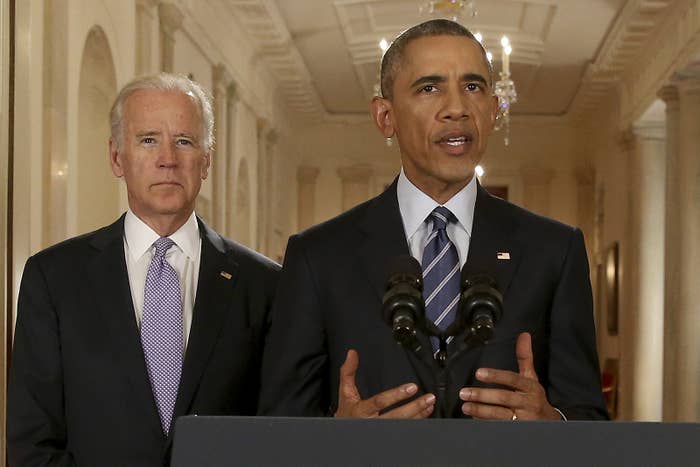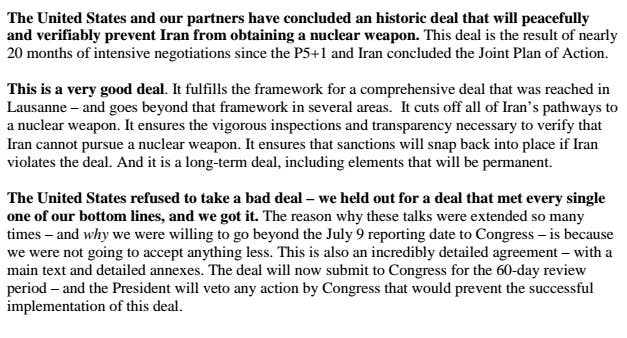
The White House is arguing that Tuesday's nuclear deal with Iran matches up with the expectations of a group of former Obama advisers who had warned that the deal could "fall short."
"The Joint Comprehensive Plan of Action (JCPOA) exceeds all five benchmarks for a good deal published by the Washington Institute for Near East Policy’s (WINEP) bipartisan group for the Iran nuclear issue," a document being circulated by allies says. A source who received the documents from the White House provided them to BuzzFeed News. "The JCPOA reaffirms U.S. policy to prevent Iran from producing sufficient fissile material for a nuclear weapon – or otherwise acquiring or building one."
Five former advisers to President Obama were signatories to a letter published by the Washington Institute for Near East Policy last month that warned that the then-looming accord “may fall short of meeting the administration’s own standard of a ‘good’ agreement." Dennis Ross, David Petraeus, Gary Samore, Robert Einhorn, and Gen. James E. Cartwright were among those who signed the letter. Their presence on the list was taken as a sign of uncertainty even among Obama allies on the deal.
The White House is circulating several other documents as well, including a list of general talking points, a one-page fact sheet, "key arguments," key excerpts of the deal itself, and an explanation of how the final deal stacks up to the framework agreement that was reached in Lausanne, Switzerland, in April.
In the talking points, the White House says that the U.S. "refused to take a bad deal" and that the deal meets "every single one of our bottom lines."

The administration has faced stiff opposition from opponents of the deal in Washington, mostly Republicans though some Democrats as well, who argue that the deal will result in greater instability in the Middle East and will threaten Israel's security. Attempts in Congress to levy increased sanctions on Iran during the negotiating process failed, and Congress now has a 60-day period in which to review the deal and vote to approve or disapprove it. Opponents of the deal are not expected to have enough votes to override a presidential veto.
The talking points and arguments being circulated by White House allies explicitly attempt to refute critics. In one sheet titled "Iran Toplines," the argument goes: "Even with this deal, we’re not letting Iran off the hook. We will continue to work closely with Israel, our Gulf allies, and other partners to combat Iranian support for terrorism and counter Iran’s destabilizing activities in the region. Indeed, we will maintain our own sanctions on Iran over its terrorist activities, human rights abuses, and ballistic missile program."
(Though terrorism sanctions are still in place, some Iranian Revolutionalry Guard Corps (IRGC) commanders, the IRGC Air Force, as well as the Quds Force division of the IRGC have been removed from the nuclear-related sanctions list under the deal.)
Nuclear related sanctions have been lifted against the IRGC Air Force, some IRGC commanders, and the Quds Force. An earlier version of this story misstated an individual on this list.
